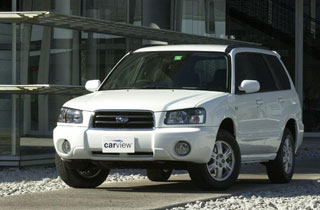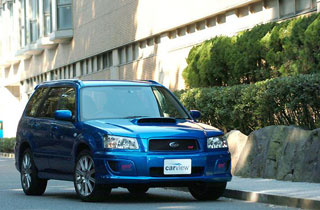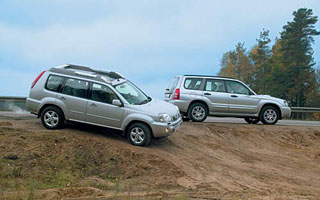Subaru Forester 2002 test drive - 2005 SUV
Wanderer and forester: dispersed the world
 Mitsubishi Outlander
Mitsubishi Outlander The compact all -around made their debut in Europe in early 2003 and already appeared in Russia in the spring.
A five-door station wagon refers to the same segment that Honda Cr-V, Toyota-Rav4; Subaru Forester.
In Russia, only gasoline (2.0 liters, 100 kW/136 hp) is sold in Russia so far) version of the car only with a mechanical gearbox in the Comfort and Sport trim levels. In November, an automatic machine and an engine of 2.4 liters, 105 kW/142 liters will appear. With. A little later, an extreme outlander of 178 kW/240 liters is possible. With. (2.0 liters with turbocharged).
Depending on the configuration, the price of a car in the interior of official dealers ranges from $ 27,990 to 29,790.
Subaru Forester
Appearing in 1998, he survived the restyling in 2000, and in the summer of 2002 he was significantly updated.
In a five -door station wagon, units from Subaru Impreza are widely used. Therefore, he is served to the consumer not only from the standpoint of universality, but also of excellent sled properties.
In the Russian market, Forester is presented with gasoline engines: atmospheric - 2.0 liters, 92 kW/125 liters. With. and with turbocharged - 130 kW/177 l. p., aggregated with a five -speed manual gearbox or four -speed automatic.
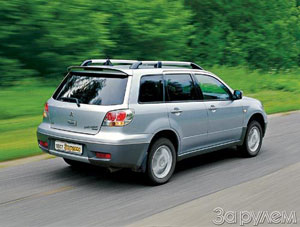 The configurations are very extensive, as well as the price range: from $ 27,380 to 36 040.
The configurations are very extensive, as well as the price range: from $ 27,380 to 36 040. Outwardly, they are so different, as if made at the opposite ends of the Earth. One - emphasized assertive and rude, frankly playing novelty, athletic. The other, on the contrary, is calm and friendly, has a roundness of shape and simplicity of style. It would seem where to draw comparisons and analogies with such polar approaches of designers. Nevertheless, these are classmates comparable in price and consumer orientation. In addition, they were released in one country by competing companies that actively compete not only in the field of high technology, but also on the routes of rally championships. Nevertheless, the heroes of this test are far from professional sports, crazy speeds and overloads. Having absorbed a drive to all wheels, a solid road clearance and energy -intensive pendants, they have acquired spacious transformed bodies designed to ensure convenience, first of all, for family vacations and travels. So, the novelty of the season of the Mitsubishi-outlet and time-tested Subaru Foreter. Cars, positioned not only as universal, but also not devoid of drivership. Well, the more interesting the comparison will be.
Rivalry or search for optimum?
 Before we begin to live the interiors and evaluate the driving opportunities, let's look under the cars, because their elements are not only roads with a hard coating. Oddly enough, much more ideological similarities are found here than in appearance. Almost the same road clearance, very close in the suspension strokes, a full -wheel drive schemes with the WISKOTS as a blocking of center differentials, similar layout decisions of individual nodes and assemblies. And yet visually the foreman is more protected. Here, the engine is closed with a powerful sheet, the release system is pulled to the body tunnel, and the most vulnerable point - the element of the ground frame - is especially not afraid of contact with the ground.
Before we begin to live the interiors and evaluate the driving opportunities, let's look under the cars, because their elements are not only roads with a hard coating. Oddly enough, much more ideological similarities are found here than in appearance. Almost the same road clearance, very close in the suspension strokes, a full -wheel drive schemes with the WISKOTS as a blocking of center differentials, similar layout decisions of individual nodes and assemblies. And yet visually the foreman is more protected. Here, the engine is closed with a powerful sheet, the release system is pulled to the body tunnel, and the most vulnerable point - the element of the ground frame - is especially not afraid of contact with the ground. All this Outlander contrasts only the steel ski of the subframe, which covers the engine, and the long output system: it limits the geometric cross-country ability of the car. It is easy to assume that the consequences of its contact with the ground will be much more painful.
A certain community is noticeable in the salons. Similar four -spoke trousers adjusted in height, seats adjusting the seats, head lighting and wipers, heating and ventilation, windshields of wipers - all this seems to be done at the same factories, only under different orders and with small deviations for the sake of developers. I will not hide, so revered Japanese traditions are initially discouraged, but the rational grain is certainly present in this.
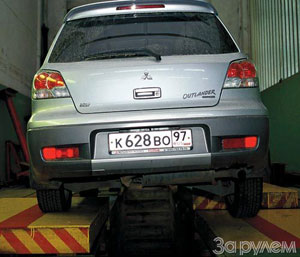 So, transplanting from the car to the car, you can complain, for example, on unusual frameless lateral glass at Subaru or mark the clumsy combination of Mitsubishi devices, but the fact that all the driver's causals will be in the usual places is guaranteed.
So, transplanting from the car to the car, you can complain, for example, on unusual frameless lateral glass at Subaru or mark the clumsy combination of Mitsubishi devices, but the fact that all the driver's causals will be in the usual places is guaranteed. Standardized places for rear passengers. Convenient sizes of openings, correct pillows and backs, openness and thoughtfulness. There is nothing superfluous here, but at the same time it is felt that the places are designed for full use in long journey.
Nevertheless, our rivals did not forget about family traits.
Outlander is, first of all, the style and the use of expensive upholstery materials. It is impossible not to pay attention to the design of the front panel, the framing of the combination of instruments, the steering wheel sheathed with the skin. The relief profile of the front seats will not go unnoticed, whose proportions and clear lateral fixation deserve only praise. The range of longitudinal adjustment disappeared a little - tall people will feel its limitation. Otherwise, it is convenient for both the driver and passengers.
Forester looks more democratic, and more traditionally. Calm, without delights, the front panel, synthetic bagel, gray in the rubber of upholstery. But do not rush with conclusions. In the discreet simplicity of the interior there is an almost complete set of electrical services, as well as a cruise control and a huge hatch on the roof. It is not a sin to pay attention to the deemultiff lever that is next to the parking brake. This corporate dish of mechanical gearboxes Subaru expands the very active capabilities of the car. The seats here, although not so exquisite in profile and configuration, but provide an undeniable advantage - a wonderful range of longitudinal adjustment.
Day of outdoor activities
Mitsubishi.
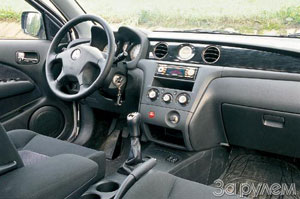 Our acquaintance begins with an uncomplicated test route - a kind of work on the city. A great time when everyone goes to meet you, pushes in traffic jams, and in the future we have fresh air, green lawns and ... of course, work.
Our acquaintance begins with an uncomplicated test route - a kind of work on the city. A great time when everyone goes to meet you, pushes in traffic jams, and in the future we have fresh air, green lawns and ... of course, work. Outlander is convenient and friendly. It is worth slightly sprinkling a slightly boring motor that seemed to be a boring, and the car easily flies along the highway at a speed of 140-160 km/h. Despite the fact that the tachometer's arrow has already exceeded 4000 rpm, the speed is quiet, comfortable and completely not felt at all. Having relaxed, I even missed a couple of times in braking and then quarreled - no, of course, not myself, but a bright sun and the prospect of working on such a day.
In general, the car is peculiar, starting from the character of the engine and ending with smoothness. The first, borrowed from Lancer, suddenly encourages the breadth of the revolution. Starting to go from 1000-1200 rpm, at the same time it easily lays the tachometer arrow on the seven thousandth mark and continues to spin. But at the same time, you do not perceive the motor as sports: on the contrary, its character is extremely even. And our car, as you know, is not small to light from some 136 liters. With.
 Outlander is unusual and otherwise: a line of a mighty hood looms in front of the eyes, and dense energy -intensive pendants repeat the profile of the road in sufficient detail. There is something in this from the older brother - Pajero, who inspires permissiveness. And the truth: it is worthwhile to appear more serious irregularities, as pendants begin to playly swallow bumps and potholes, and the car that seemed too muscular suddenly seems to take off over obstacles. Of course, there is a limit to everything, but even on rather broken roads, the outlander holds well as well as tired of the clang of limiters and impulsive shake.
Outlander is unusual and otherwise: a line of a mighty hood looms in front of the eyes, and dense energy -intensive pendants repeat the profile of the road in sufficient detail. There is something in this from the older brother - Pajero, who inspires permissiveness. And the truth: it is worthwhile to appear more serious irregularities, as pendants begin to playly swallow bumps and potholes, and the car that seemed too muscular suddenly seems to take off over obstacles. Of course, there is a limit to everything, but even on rather broken roads, the outlander holds well as well as tired of the clang of limiters and impulsive shake. In management, he is understandable and reliable. Of course, this is not a playful passenger car, ready to paint from a row in a row, here, on the contrary, the weight of each rebuild is felt, but at the same time the reactions of the machine pleasantly surprise with logic. Now let's complicate the task a little, having inflated the pace.
On direct outlander, it is still kept by great, but in corners the front axis slipping is not uncommon, when the steering wheel is sometimes supplemented with the drift of the rear. Of course, such a driving style is not entirely suitable for a family all-terrain vehicle, but still it must be borne in mind that in some situations of revenge, it can for a long time. The drive to all the wheels, of course, helps to catch the car, but she still does not like panobracy.
 Subaru. After the emphasis of the outlander, the Forester is rather perceived as an ordinary station wagon: you sit below, and everything around is simple. But here is a characteristic sound of the opposition motor, then a barely noticeable hum of all -wheel drive transmission, and the car is transformed - it has character traits. The forester is definitely noisier: in addition to the engine, aerodynamic whistles, rumer tires are well audible. And although they do not press too much on the eardrum, this is perhaps the most serious losing to the outlander. Everything else is very balanced, and in a rider plan, Forester defends his position extremely confidently.
Subaru. After the emphasis of the outlander, the Forester is rather perceived as an ordinary station wagon: you sit below, and everything around is simple. But here is a characteristic sound of the opposition motor, then a barely noticeable hum of all -wheel drive transmission, and the car is transformed - it has character traits. The forester is definitely noisier: in addition to the engine, aerodynamic whistles, rumer tires are well audible. And although they do not press too much on the eardrum, this is perhaps the most serious losing to the outlander. Everything else is very balanced, and in a rider plan, Forester defends his position extremely confidently. Obviously, its engine does not have such a wide working range of revolutions, but at the same time it is convenient and burdened, and the converged transmission gives the car pleasant abuse. Of course, this car is heavy for a two-liter 125-horsepower engine, but thanks to the verified interconnections, this is felt only with a very intense pace of driving.
 Forester has always been famous for good smoothness. And now, unlike a dense, elastic outlander, he surprisingly gently damps a road trifle and small gentle waves. Nevertheless, in this comfort is still more from an ordinary passenger car. With the speed of speed, Subaru is more noticeable for the buildup of the body, more amplitude of vertical movements. It turns out that one is more like a classic alternate, hard, but impenetrable, the other inherited the comfort of a passenger car, and with it some freedom of movement up and down.
Forester has always been famous for good smoothness. And now, unlike a dense, elastic outlander, he surprisingly gently damps a road trifle and small gentle waves. Nevertheless, in this comfort is still more from an ordinary passenger car. With the speed of speed, Subaru is more noticeable for the buildup of the body, more amplitude of vertical movements. It turns out that one is more like a classic alternate, hard, but impenetrable, the other inherited the comfort of a passenger car, and with it some freedom of movement up and down. Forester is in hand in terms of controllability. He is not only more maneuverable, but also rides differently. Here, more precisely, the relationship, less delay and from this riding is somehow more familiar and easier. In quick turns, the car is much more active: it sensitively reacts to the actions of the steering wheel and the gas pedal. At the entrance to the turn, we also encountered slippers of the front axle, but the car fights with them so intelligently that it does not allow us to doubt the correctness of your actions for a second, and most importantly, in the successful outcome of the experiment.
Meanwhile, the asphalt is replaced by a gravel coating, and then completely with a heading. But both SUVs do not complex at all, trying to demonstrate all their technical potential.
Honestly, it is small on bad roads, although both are able to confidently move even along the fragmented country. However, it is worthwhile to attack something loose (in our case - the gravel that has liked the photographer so fast), as you quickly encounter diagonal hanging; The clutch begins to burn, and the cars are handed over. Alas, this is not their element. Even a foreman with his lowering gear, having grown at first, soon retreats: there is not enough power, road clearance and elementary invulnerability inherent in real rogues. It seems that the day of outdoor activities is over.
 A MATTER OF TASTE
A MATTER OF TASTE Oh, these Japanese - they know how to puzzle!
At first glance, everything seemed simple and logical. One is new and torn into battle, the other is an already established, worked out product. It would seem that the outcome of the struggle is obvious. Nothing like this! It is possible, if you pedantically place the grades, then carefully dry them, a small difference will turn out. In whose favor? The answer is as contradictory as the results of our measurements, where the outlander is better than the dynamics, and the maximum speed is higher in the foreman, or the braking distance, which varies only half a meter - despite the fact that the newcomer has all the brakes of disk, and the forester has the rear drum. Even the prices are comparable: Mitsubishi-outlets in the Sports configuration costs $ 29,790, and Subaru Forester $ 31,280-a little more, and then due to the hatch on the roof and cruise control. So it seems that you have to choose with your heart, although one of ours summed up as follows: if you need a car to comfortably carry your loved ones - choose an outlander, but I want to drive - look closely at the Forester.
The trunk is small - the developed release and full -size reserve is to blame.
 Two -liter 136 -horsepower engine - basic equipment;
Two -liter 136 -horsepower engine - basic equipment; Sports are characterized by expensive upholstery materials, and the steering rim is covered with leather.
White scales of the instrument panel revive the dark background, but look alapo.
Everything is thought out from behind for convenience on long trips.
Front seats with developed relief, in the armrest - box for trifles.
Subaru Forester
The trunk is capacious and convenient ...
... And the engine is not angry, but burdened.
The interior does not affect with stylistic delights - however, sitting down,
you get settled without comments and
you find everything you need for a long and comfortable existence.
Correct pillows and backs, spaciousness and thoughtfulness are a completely family interior.
The demultiplitor (its lever next to the handbrake) adds confidence on the lanes.
Searching for differences in suspension moves - in fact, they are almost the same.

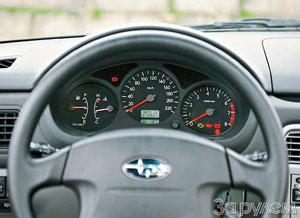




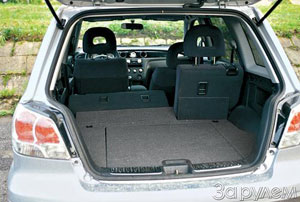
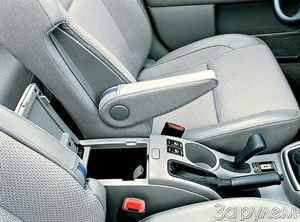

Sergey Voskresensky
Photo: George Sadkov
Source: The magazine "Driving"








